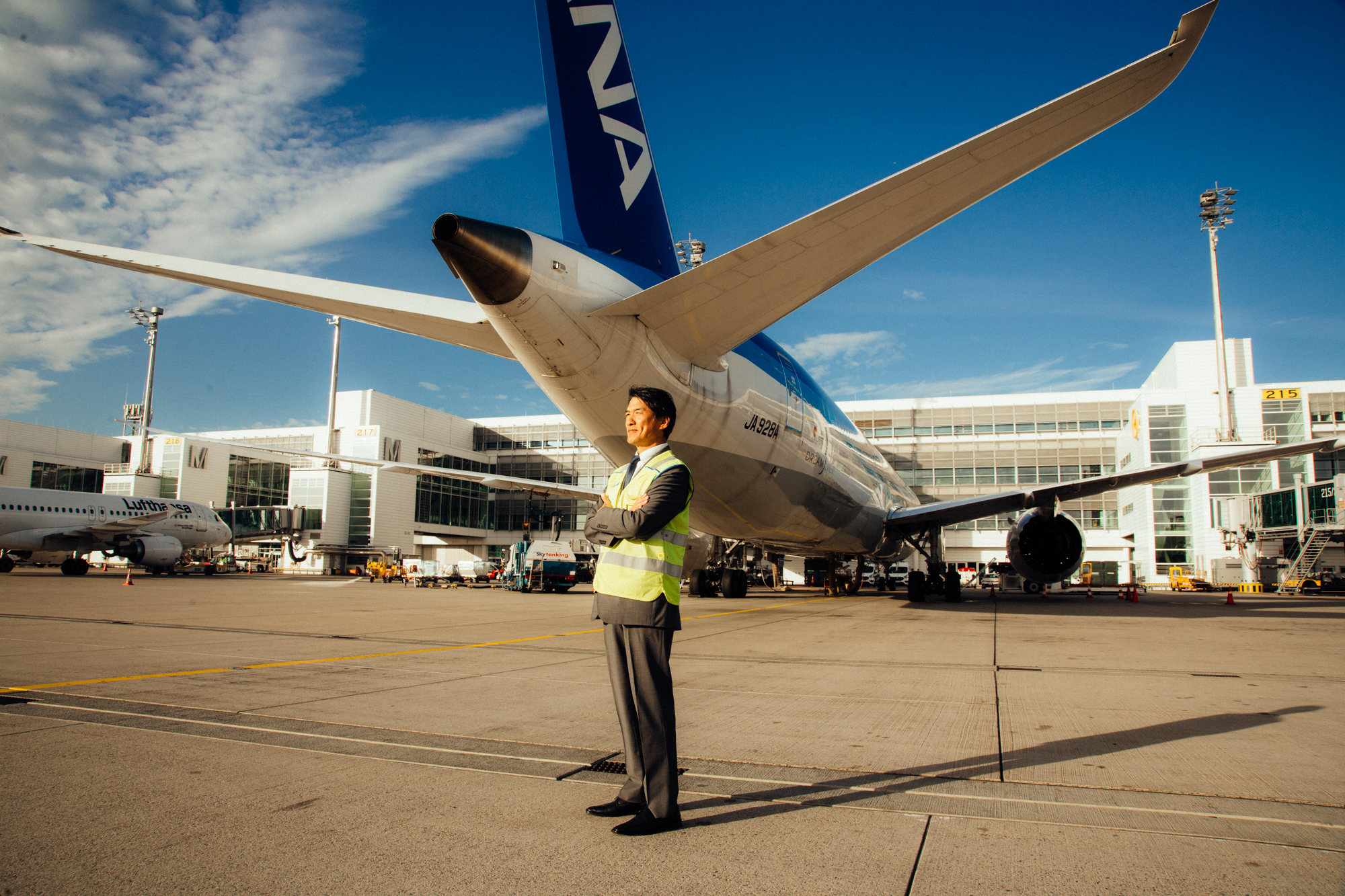Every Japanese and Japan lover living in Germany probably knows Immermannstraße in Düsseldorf. Since the 1960s, many Japanese companies and hotel brands of Japanese origin have settled there – or the Japanese Consulate General. Japanese-run restaurants and supermarkets, bakeries, bookshops, hairdressers and other shops have also established themselves. Although you are in Germany, you have the impression you are travelling through Japan. One entrepreneur who plays a central role in the development of this leading Japanese quarter in Europe is Haruhiko Saeki. J-BIG talked to the founder of Brickny Europe GmbH, which is behind the Takumi ramen restaurants and other restaurant concepts, about the restaurant and franchise business and the plans for the “Little Tokyo Project”. A conversation about the desire to bring authentic, delicious Japanese food and Japanese service to Europe – and the development of the last 26 years on a culinary entrepreneurial journey.
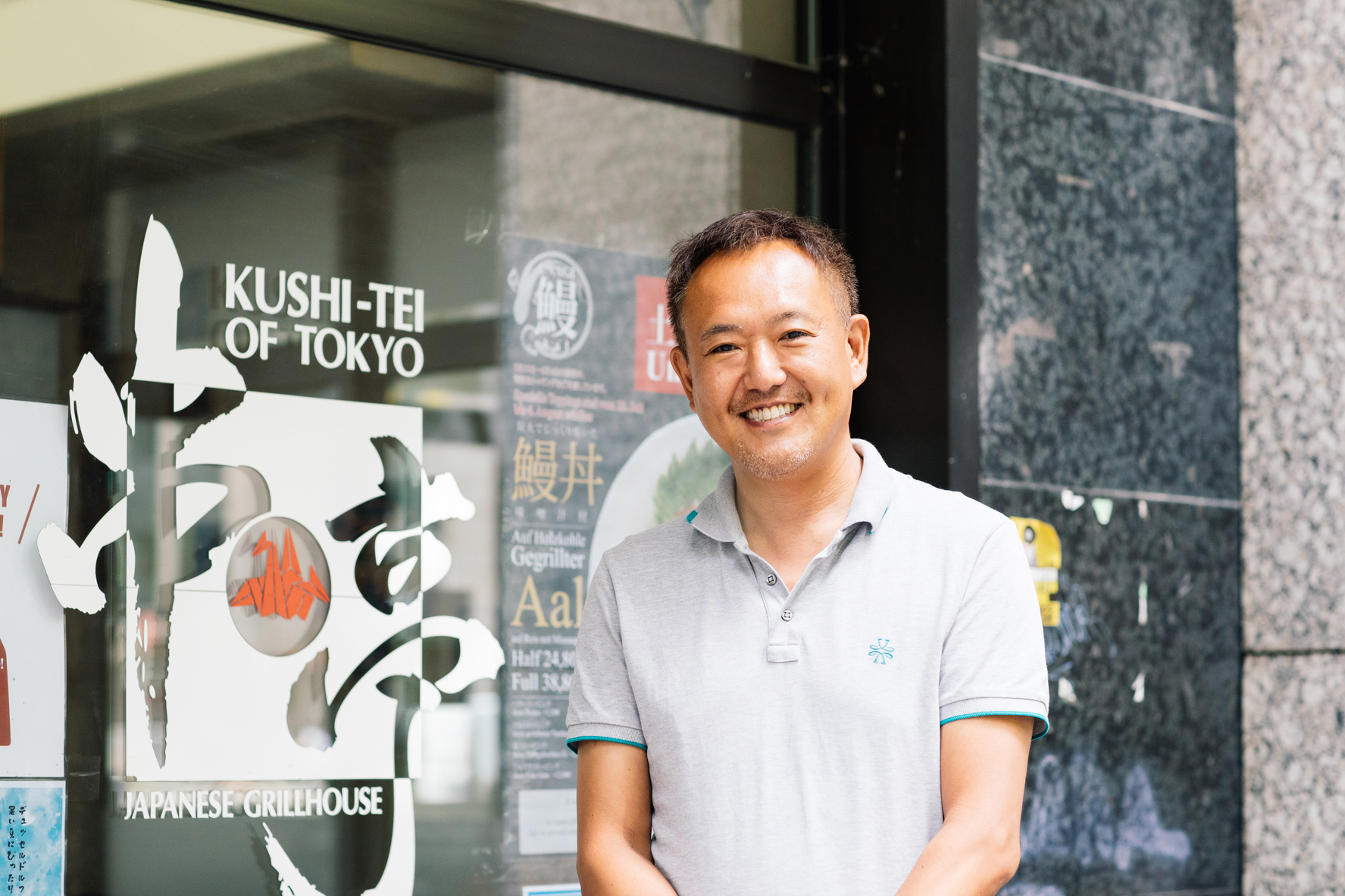
J-BIG: How did it start with Brickny Europe?
Haruhiko Saeki: In 1995, at the age of 26, I moved from Japan to Amsterdam to work for a restaurant company that ran a yakitori-izakaya chain called “Kushi-tei” in the Netherlands, Belgium and Germany. After three years in the Netherlands, I became the manager of the Düsseldorf branch. The environment changed at that time and the trend was that gradually each country should run its location independently. So I became self-employed, founded my own company, Brickny Europe, in 2001 and started operating the Kushi-tei in Düsseldorf. In the beginning, we started as a private company and became a GmbH in 2012.
J-BIG: How did other restaurants come about?
Haruhiko Saeki: When I was running Kushi-tei on Immermannstraße, the owner of the café next door said to me, “I’m giving up the shop, why don’t you take over?”, and as a result I opened Café Relax in 2003. We have since changed the concept to a restaurant with tonkatsu, Japanese pork chops, but at that time we offered a typical Japanese café menu with fruit parfait and omuraisu, an omelette rice dish – and in the late evening we also had ramen on a trial basis.
Since my time in the Netherlands, I had the desire to open a ramen shop in Europe, so I told the owner of a ramen restaurant that existed in Immermannstraße at the time to let me know if he ever planned to terminate his business. He actually contacted me when he closed the shop, and in 2007 I took over, changed the name and opened an authentic ramen restaurant. That was the first “Takumi”.
At that time, I was just trying to build good restaurants and I was constantly moving between the three restaurants on Immermannstraße, cooking, serving customers and running each place. Then in 2012 I opened the second Takumi restaurant and in 2015 the third. I started to feel that with this approach, more businesses outside Immermannstraße would be too much for me. Somehow I managed to run several shops with great effort, but it was really hard work, both physically and in terms of time. It was definitely the most exhausting time of my life, but looking back, it was perhaps also the most beautiful.
We wanted to open more shops at that time, but it was central to this that the taste should not be changed. For this reason, I thought systematisation was necessary and started to consider a franchise model. We developed products under the Takumi brand – which included not only our main products like noodles and sauce, but even side dish menues – set up a training system and a distribution network, and in 2017 launched our franchise system in the Netherlands and Belgium.
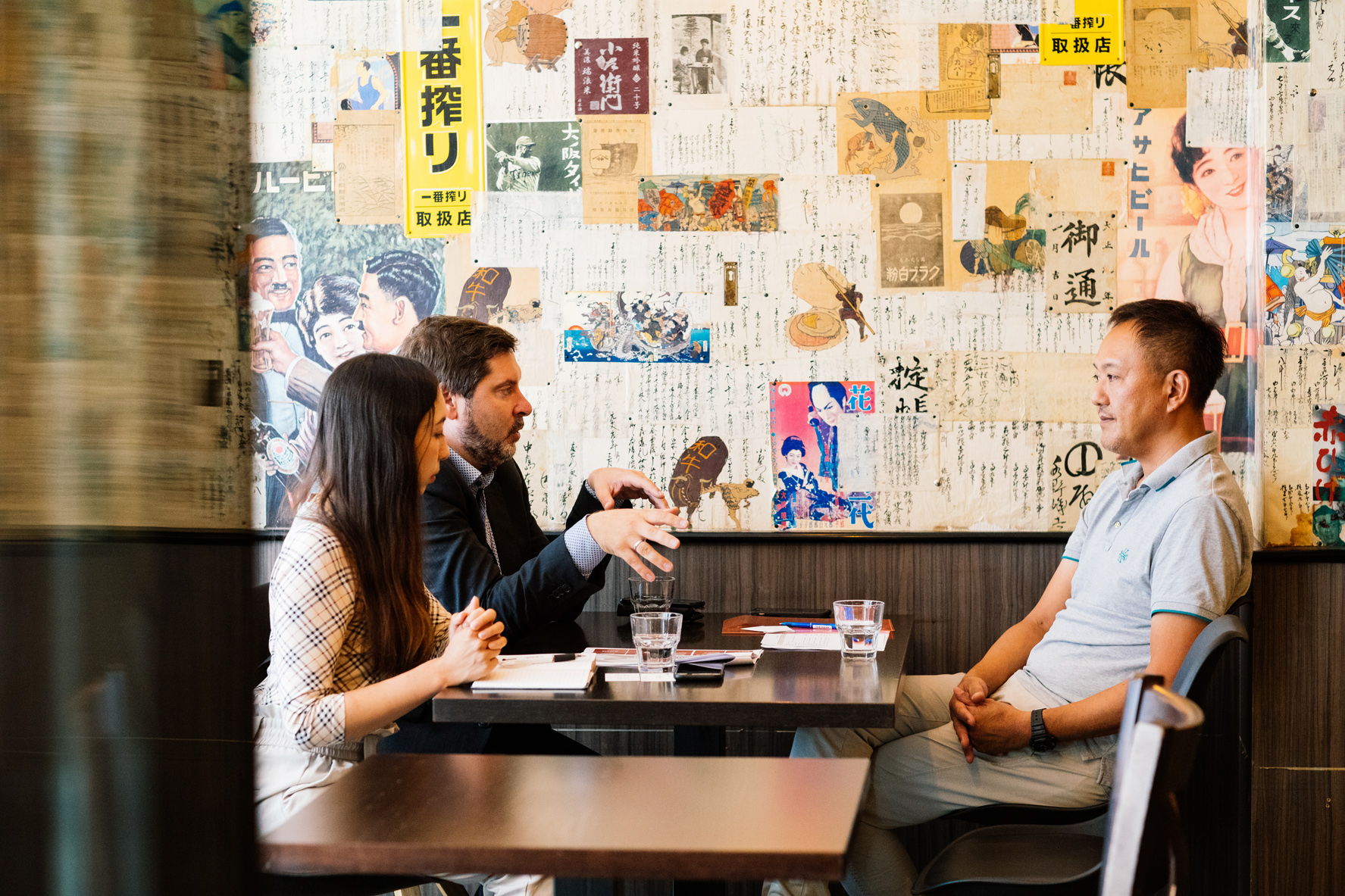
J-BIG: What is Brickny Europe’s business set-up today?
Haruhiko Saeki: Brickny Europe is a company that operates 14 Japanese restaurants in Düsseldorf, Germany, with various concepts; including ramen restaurants, yakitori-izakaya, yakiniku and tonkatsu restaurants. Brickny operates together with two related companies: Takumi Food Service GmbH, which mainly supplies food for the franchise business, and BE Media & Design GmbH, which manages merchandise sales and media activities. The three companies work hand in hand and are currently also realising the further revitalisation of the area surrounding Immermannstraße with the “Little Tokyo Project”.
The Takumi brand is now in its sixteenth year and has a total of 50 restaurants in Germany, the Netherlands, Belgium, Spain, Italy, the Czech Republic and Austria. The cities with the most shops are Düsseldorf and Barcelona with six restaurants each, followed by five in Antwerp and four in Brussels.
Brickny Europe currently employs just under 200 people in administration and in the restaurants, made up of 50 per cent full-time and 50 per cent part-time staff. In the last few months, we have exceeded our turnover figures from 2019, before Corona, but as in every industry, we still have staff shortages, which we are currently addressing with reduced opening hours and rest days.
Business from January to March this year was not profitable due to the continuing impact of Corona, but from April onwards sales gradually recovered and with the summer and autumn months we have seen signs of an upturn.
We continue to struggle: with the effects of Corona, staff shortages, rising wages, the sudden increase in electricity and heating costs and inflation. But we are convinced that we will be able to overcome these circumstances with our team. And we will do so through our concept of “Japanese food that is enjoyed abroad and that Japanese people think is delicious”, which aims to create a nostalgic and comforting experience for Japanese people and an authentic experience of Japanese food culture for our non-Japanese customers.
Free Subscription
“J-BIG – Japan Business in Germany” is the e-mail magazine dedicated to Japanese companies and their business activities in the German market.
J-BIG: Tell us a little more about your franchise model.
Haruhiko Saeki: There are different types of franchise models, but in our case we enter into a contract where we receive fees for the use of the Takumi brand and for the sale of brands and products, while we provide consistent food products and know-how. In the case of our shops in the Netherlands, for example, operators are free to set up their own shops, hire staff and leave the management to local staff. In general, it is not unusual to agree on a monthly licence fee of, for example, 5 per cent of sales, but in Europe we believe such a system is difficult to implement. That is why we work under a franchise system with contracts based on the turnover of goods distributed and produced by our head office.
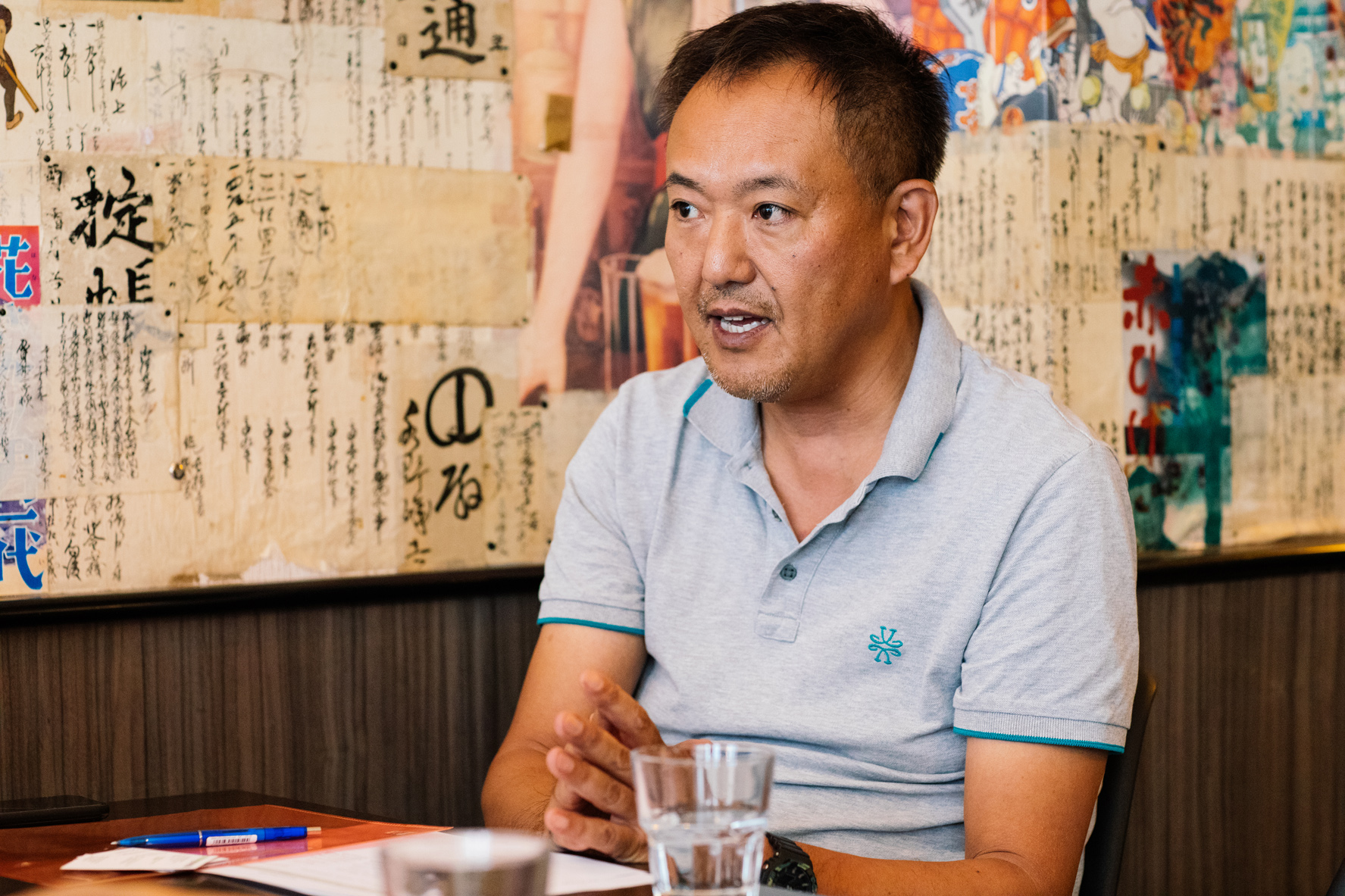
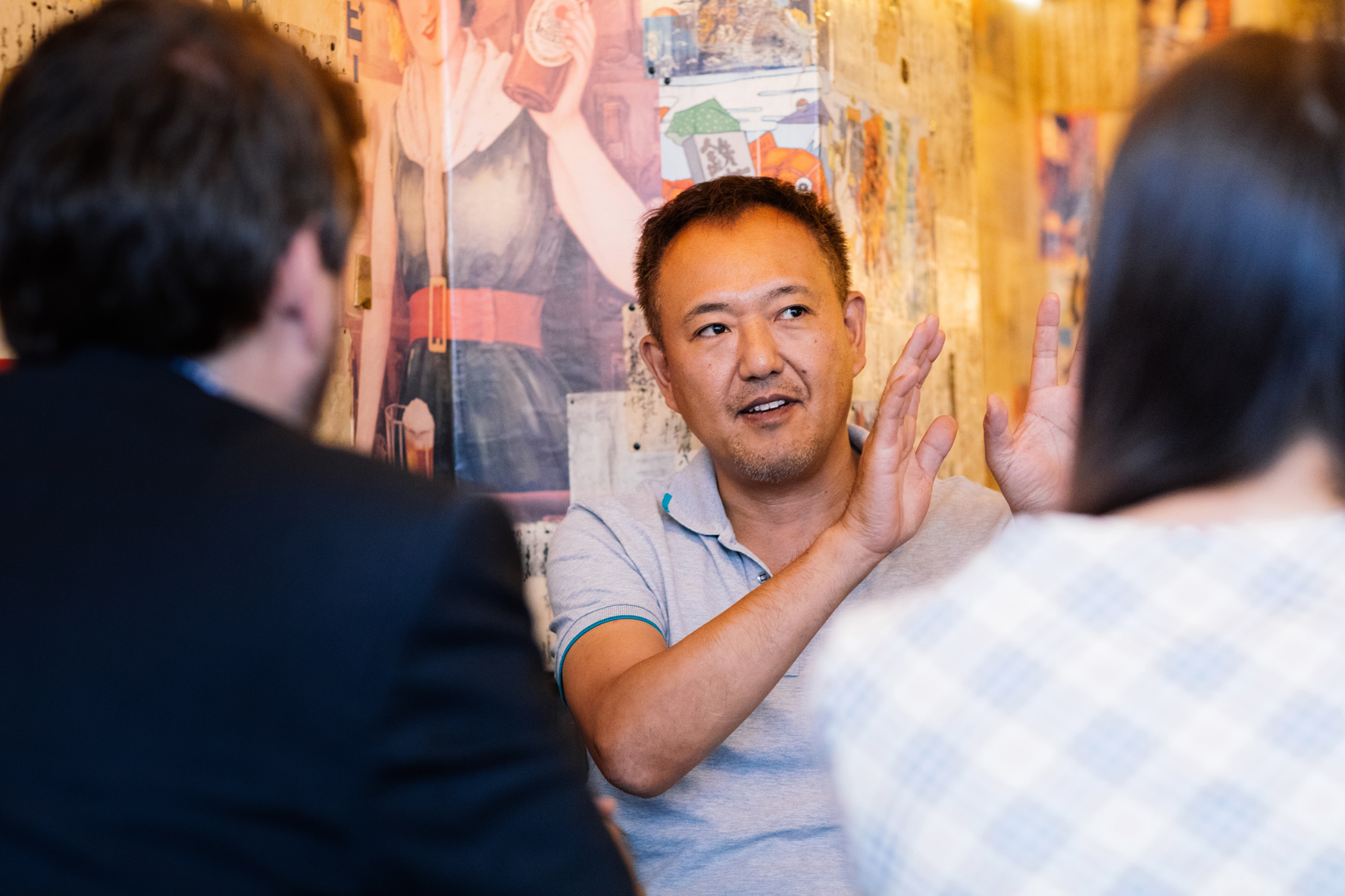
J-BIG: What is important to you when working with business partners?
Haruhiko Saeki: Firstly, the business partner must love ramen, or rather, love Takumi’s ramen. We believe that you can work for what you love with passion and full commitment. That’s why we are happy when someone is convinced of the idea: “Together we want to bring ramen by Takumi to the world! “. Secondly, the business partner should be someone who appreciates Japanese culture, because food culture is also part of Japanese culture. I believe that Japanese food culture includes not only the products, but also the service based on Japanese hospitality as well as the Japanese atmosphere of the restaurant. On the other hand, no previous experience in gastronomy is required. We have our own training program and expertise in staff development, so we hope that the business partner can face this challenge with confidence.
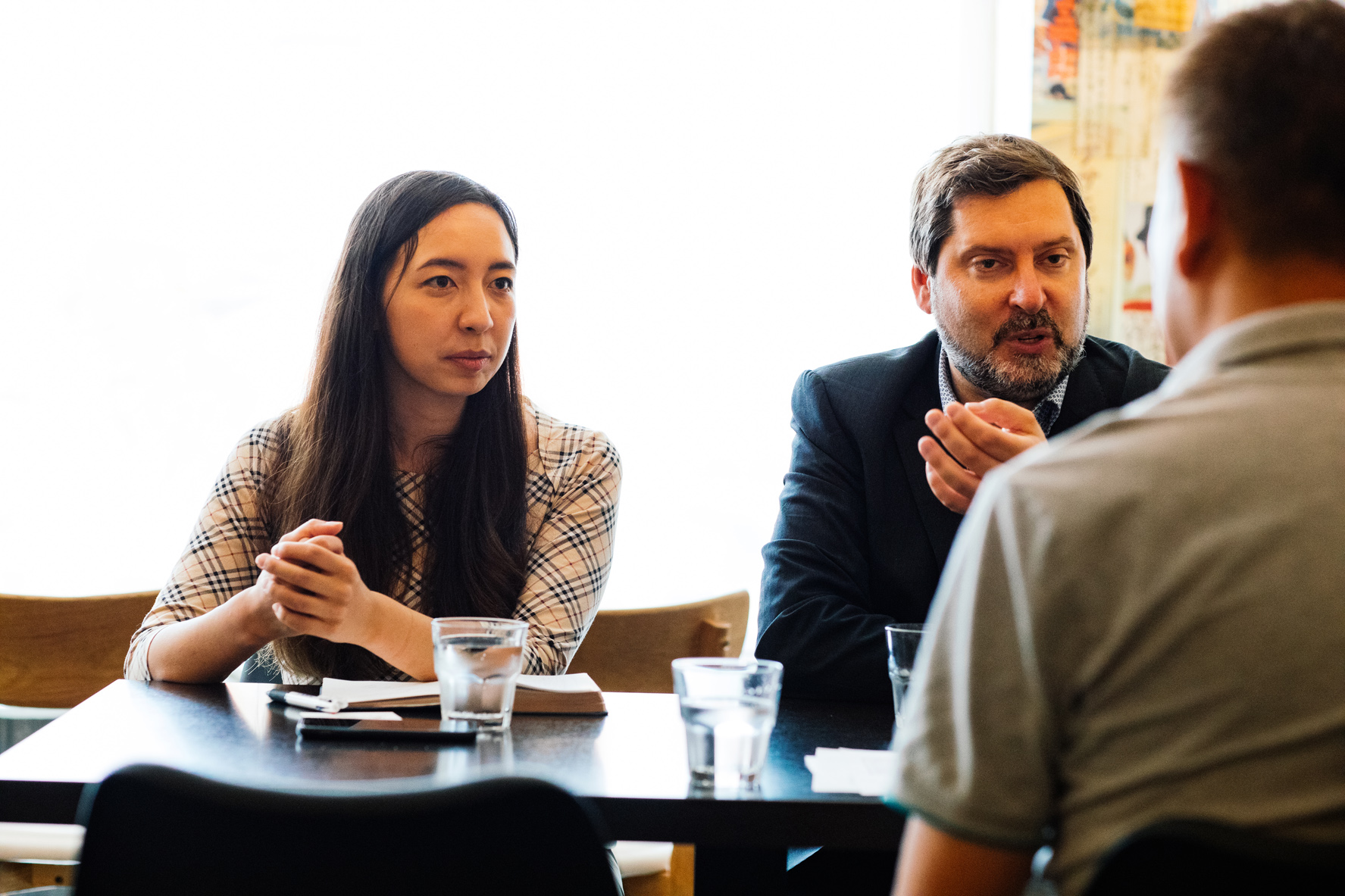
J-BIG: Why do ramen shops fit the franchise concept?
Haruhiko Saeki: Ramen initially requires a lot of time to create a satisfactory recipe. But as long as a stable ingredient logistics is in place and cooking instructions have been created, the implementation can be passed on quite easily. In other words: If the cooking time of the noodles, the amount of soup, the temperature, the sauce and the spices are precisely specified and these quantities and times are adhered to, then it is difficult to make mistakes when making ramen. It’s different with sushi restaurants, where very experienced chefs are important. For the same reason, although we receive many requests to expand our izakaya restaurant “Kushi-tei” in different cities, it is a type of restaurant for which it is difficult to develop new shops because the training and experience of the staff play a big role.
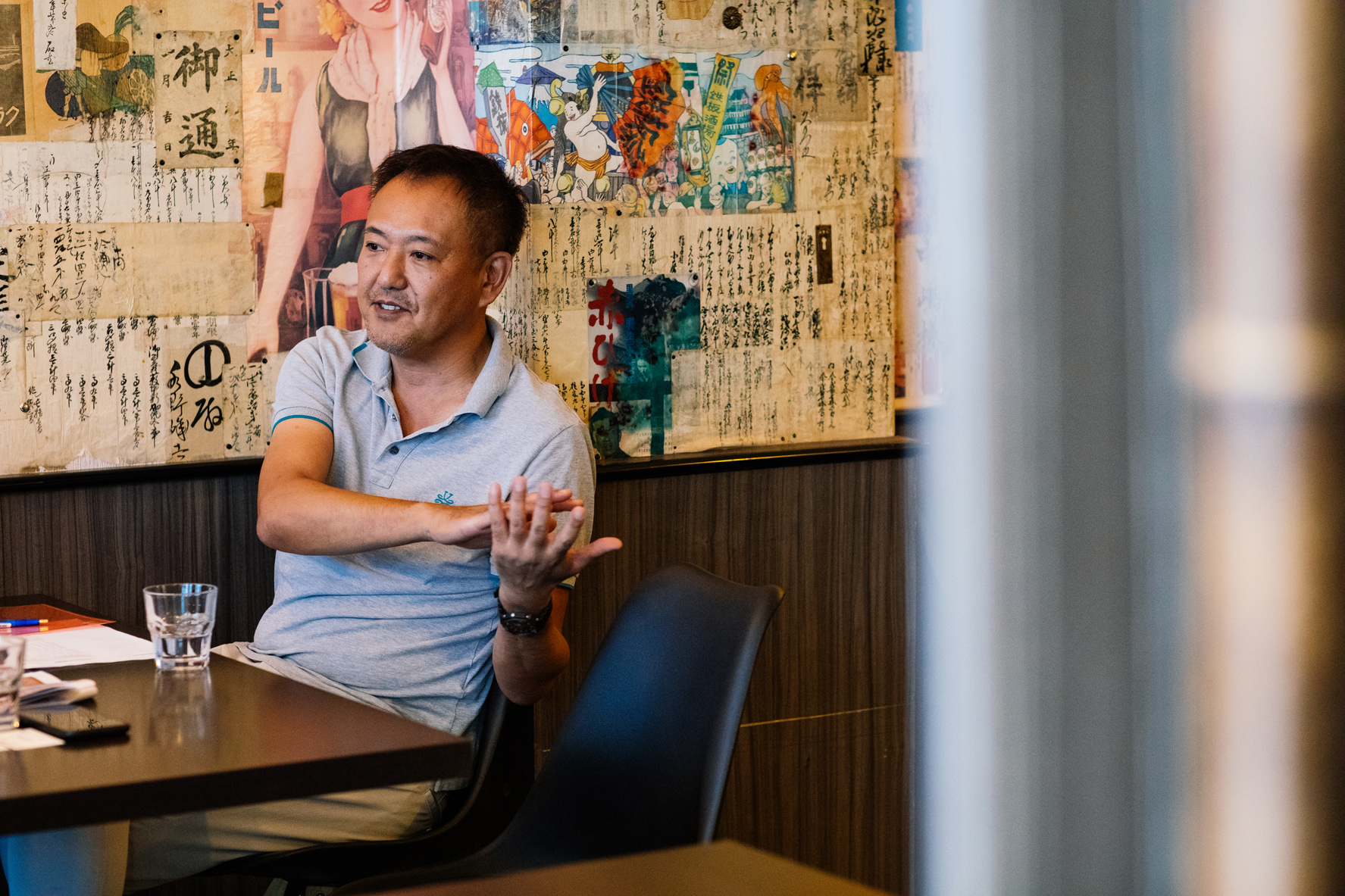
J-BIG: Why do you think there are relatively few Japanese restaurant chains in Germany and Europe?
Haruhiko Saeki: Japanese restaurant companies have expanded in the last 20 years, especially in Asian metropolises, for example in Bangkok, Hong Kong, Shanghai or Singapore, and quite a few are considering opening shops in the USA as well. In Europe, however, this is hardly the case. I think Europe has the image of being very far away from Japan – even if the true distance is not that much greater. Another reason is certainly that Japanese are not good at foreign languages and tend to adopt a passive attitude. They think: “German in Germany” or “Italian in Italy”, and that is why many companies try to expand to Asia and the USA, where it is easier to get by with English.
In addition, the strict EU import restrictions on Japanese food basically prohibit the import of meat and fish from Japan. In contrast, Japanese food and fresh fish from the Tsukiji market are often brought to the US and Asia seven times a week. I think this is also still a bottleneck.
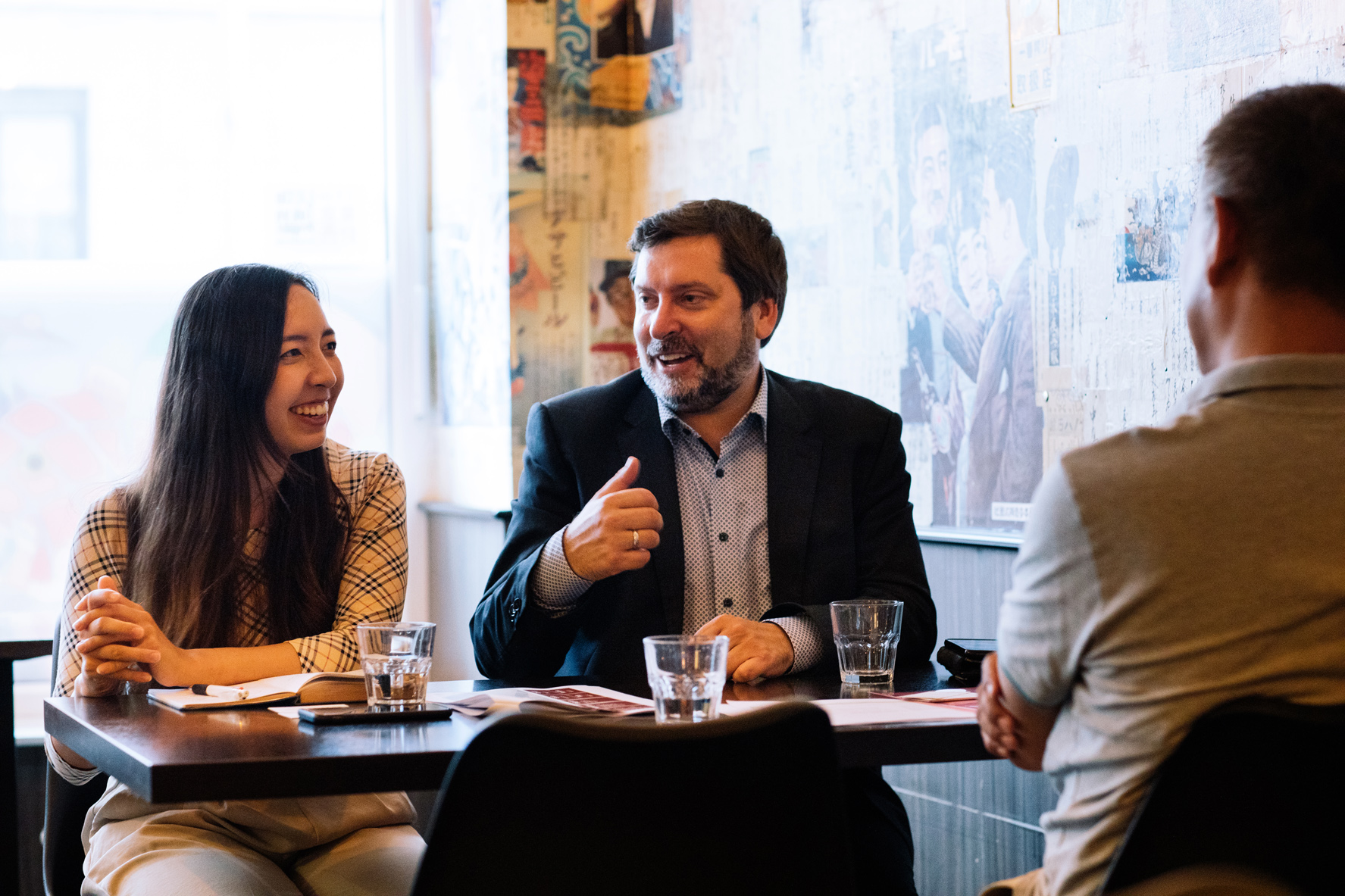
J-BIG: Nevertheless, it would be great if the Japanese restaurant industry takes up this challenge.
Haruhiko Saeki: Recently, I have been invited to lectures and other events organised by the Japan External Trade Organisation (JETRO) in Japan and online, and there are more opportunities to talk to restaurant owners and businesses interested in expanding abroad. I think the number of businesses entering the European market will increase in the next two to three years. Japanese feel more secure when they have role models. If someone else has made it, it gives them the courage to try it too. Also in terms of the concept of the “Little Tokyo Project” that we are striving for on Immermannstraße, I believe that the neighbourhood will increasingly become an authentic Japanese place where more and more restaurant entrepreneurs with a lot of skill and experience will set up shop.
“What can we do to ensure that ramen is accepted by people who have grown up in a different environment and have a different food culture?”
J-BIG: By now, the Takumi brand exists all over Germany. What do you think are the reasons for this success?
Haruhiko Saeki: The weather and climate have a great influence on people’s personalities. Just as national character differs between hot and cold countries, I think food also has such characteristics, such as saltier food in cold countries and less greasy food in hot countries.
Takumi’s concept is based on Sapporo ramen. Hokkaido and Germany are almost at the same latitude, and it is said that food and culture are similar. That also applies to beer. That’s why I thought at the time that Sapporo ramen would certainly work well as a base, and I never doubted this choice later on either. The noodles were made by Nishiyama-Seimen in Sapporo, and together we are working on the further development of ramen culture.
The company works hard every day to ensure that its products and services are of the highest quality. However, the truth is also that we do not currently offer ramen that is 100 percent Japanese. “What can we do to ensure that ramen is accepted by people who have grown up in a different environment and have a different food culture? What should we do?” I analysed and thought a lot about the balance between noodles and ingredients, the preferred toppings, the type and amount of flavoured oil, the response to increasing vegetarianism, the boom of spicy dishes among the younger generation, etc. Looking back, we only had about 10 to 20 percent local customers when we opened and many of them came thinking it was a sushi restaurant, got annoyed and left because there was no sushi on the menu. This was repeated several times. Fortunately, the number of local customers has now stabilised at over 90 per cent in each shop and we are very grateful for the recognition we have gained to a point where people were queuing outside the shops.
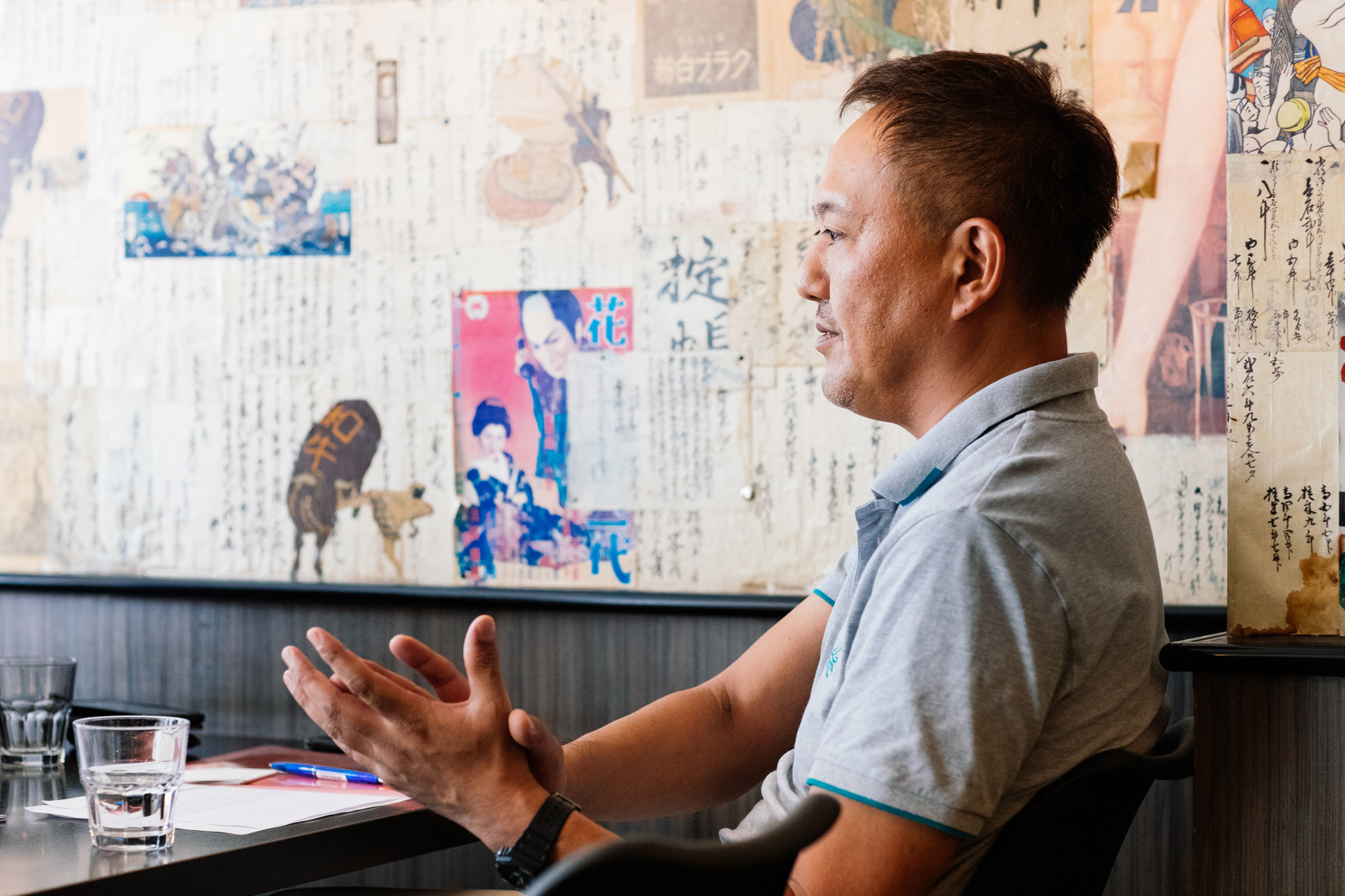
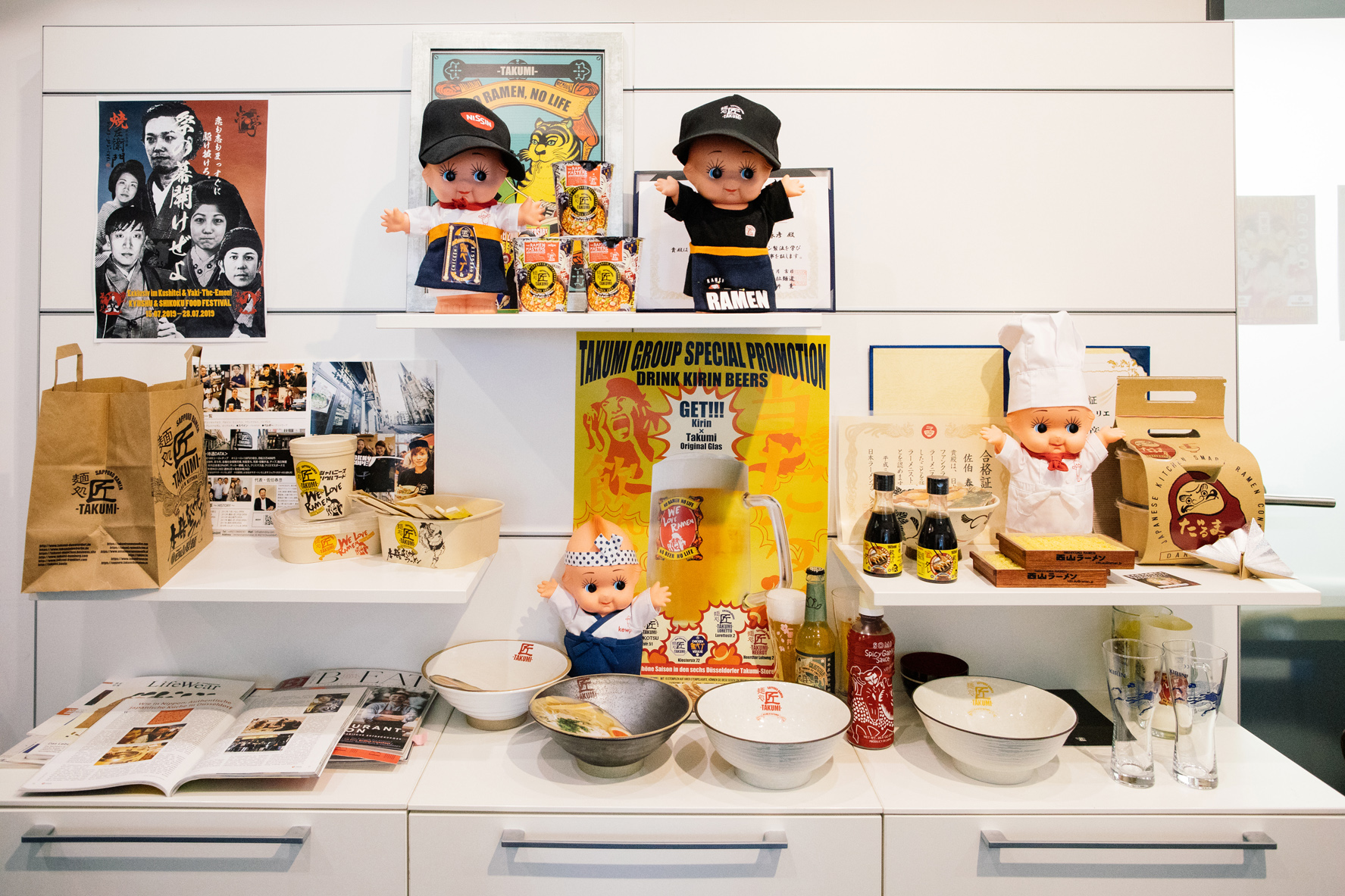
J-BIG: You now also sell Takumi instant noodles, don’t you?
Haruhiko Saeki: Yes, the instant noodles from the collaboration with Nisshin Shokuhin / Nissin Foods are sold through Takumi Food Service for commercial wholesalers and through BE Media & Design GmbH’s online merchandising department towards retailers. The product was developed so that people can enjoy the taste of the Takumi brand at home. In the Corona pandemic, the sales target was quickly reached and the product continues to be sold in Takumi restaurants and retail shops in each of our location countries and is also popular as a souvenir from Düsseldorf.
In June last year, Takumi also collaborated with UNIQLO. Visitors to Takumi restaurants who ordered ramen received a voucher for a UNIQLO cloth bag, while customers at UNIQLO shops received a voucher for gyoza at Takumi. The plan was to increase the number of fans for both sides. Incidentally, the t-shirts that Takumi employees wear while working are also made by UNIQLO. In summer, it can get up to 40 °C hot in the kitchen. That’s why they wear AIRism shirts, which absorb sweat and dry quickly. These T-shirts are also sold in shops and online and sell very well.
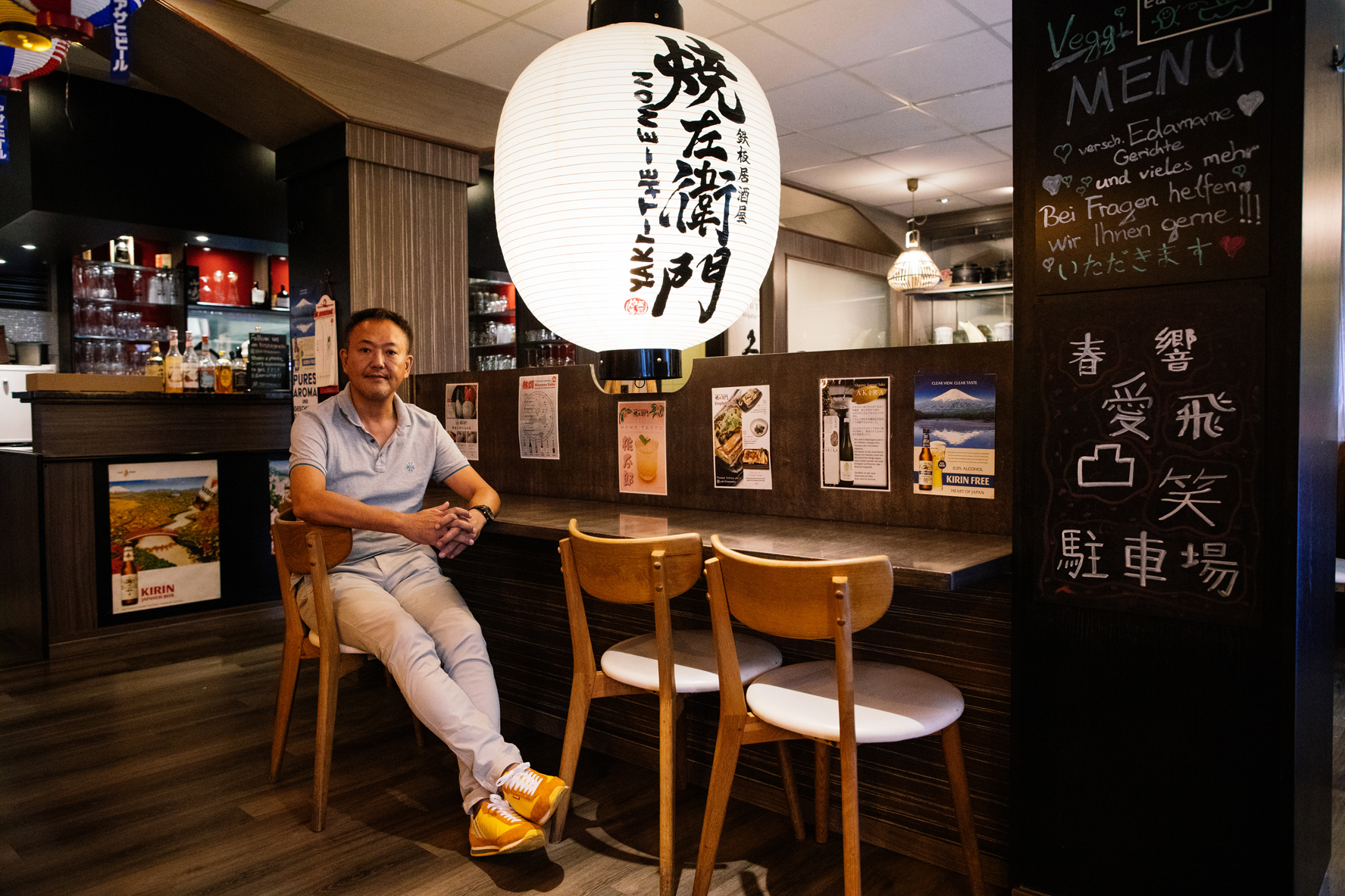
J-BIG: What is your vision for the future?
Haruhiko Saeki: In Germany, people from different countries run sushi and ramen restaurants because these products sell. However, I want Germans to be able to get real Japanese food. If a German tries ramen for the first time in a restaurant and then doesn’t like it, he will certainly come to the general conclusion that ramen is not tasty. The same impression would be created if the first sushi one tried was from a supermarket. That’s just not an accurate translation of food culture. I want people to experience authentic Japanese food as much as possible. Of course, developments and fusions based on traditional Japanese cuisine are not a problem, but it is important to me to give Europe the Japanese cuisine that Japanese people also like. That has been my motivation since the company was founded.
And from now on, we want to go beyond “food” to communicate the appeal of Japanese culture, which is why we started the “Little Tokyo Project” two years ago. The idea is to involve the city of Düsseldorf and various businesses to make Düsseldorf an even more attractive destination. Many people visit Düsseldorf mainly on weekends to experience Japanese food and cosplay, but in the future we want to make Düsseldorf a place where even more people come together by offering a wider range of Japanese culture, Japan-related events and entertainment like karaoke and gaming arcades. Of course, the hurdles are high because this is a different kind of business than what I have done before, but still, I only live once and I want to take on this challenge.
The city has certainly changed in recent years: The street name signs on Immermannstraße are now also written in Katakana and if you search for the city on Google, “Little Tokyo” is also displayed. Thanks to the efforts of the city of Düsseldorf, the Chamber of Industry and Commerce and the businesses on Immermannstraße, cherry blossom trees will be placed on Immermannstraße next spring. So you can not only shop and eat in “Little Tokyo”, but also enjoy the wonderful Japanese Hanami culture!



